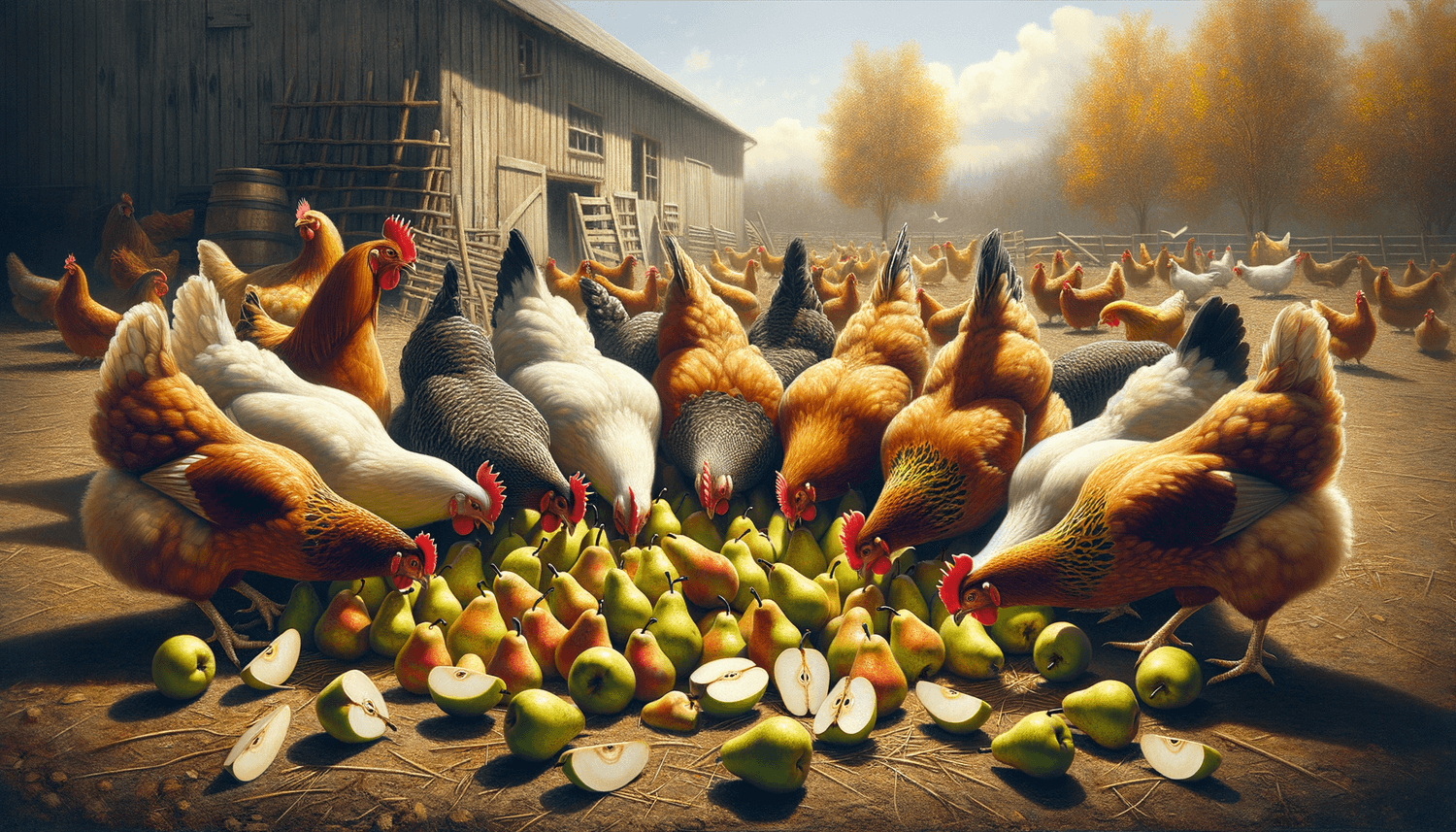Chicken lovers, cluck to attention because today, we’re taking a deep dive into the juicy, fruity mystery of pears and our beloved feathered friends! Can chickens eat pears? Are pears a tasty treat or a perilous poison? Fear not, fellow chicken enthusiasts, as we explore the ins and outs of a balanced chicken diet, the potential benefits and risks of these succulent fruits, their nutritional value, and how to serve up some pear-fect treats for your backyard brood.
Can chickens eat pears?
Yes, chickens can indeed eat pears, and it is safe for them to do so. Pears make an excellent treat for chickens, providing a natural source of vitamins and minerals that can contribute to a healthy diet. Just remember to feed pears in moderation and maintain a well-balanced diet with other essential nutrients for your flock.
A balanced diet for chickens
Just like humans, chickens need a balanced diet to ensure they remain healthy and happy. The foundation of a chicken’s diet should primarily consist of a high-quality chicken feed, which provides them with the essential nutrients, vitamins, and minerals they need for optimal growth and productivity. This chicken feed should make up around 80-90% of their diet, offering all the nutritional building blocks necessary for a strong and robust flock.
Now, let’s talk about treats! The remaining 10-20% of their diet can consist of delicious treats like fruits and vegetables, perfect for satisfying their pecking urges, keeping them entertained, and supplementing their nutritional intake. While indulging your feathered friends with their favorites is certainly enjoyable, it’s crucial to remember the importance of moderation to maintain a well-balanced diet and not to replace their primary source of nutrition: the ever-so-important chicken feed.
Nutritional value of pears for chickens.
Feeding pears to chickens offers a range of nutritional benefits. Pears are a great natural source of vitamins, minerals, and hydration, which can all contribute to the general well-being of your backyard flock. One of the significant benefits of pears is their high vitamin C content, which plays a vital role in maintaining the immune system, helping your chickens stay healthy and fight off infections. Additionally, pears contain other essential vitamins, like vitamin K, which helps in blood clotting and bone health, and vitamin A, which supports vision and overall good health.
Apart from vitamins, pears also provide a variety of minerals necessary for the proper functioning of the chicken’s body. These minerals include potassium, which helps to balance fluids and maintain a healthy blood pressure, and magnesium, which aids in energy production and supports bone health. Furthermore, pears offer hydration due to their high water content, which can be particularly beneficial during hot weather, ensuring your chickens stay well-hydrated and comfortable.
Lastly, the dietary fiber found in pears has a mildly positive impact on a chicken’s digestion. While chickens, as omnivorous birds, don’t rely as heavily on fiber as we humans do, it still provides some benefits in terms of regulating their digestive process, keeping them feeling satisfied, and supporting overall gut health.
Nutrition table of pears for chickens.
| Information | Description |
|---|---|
| Nutritional Value | Pears offer vitamins A, C, and K, as well as minerals like potassium and magnesium. |
| Suggested Serving Size | Feed in moderation, as part of the 10-20% treat allowance in their diet. |
| Safe Feeding Practices | Introduce pears gradually to monitor for any allergic reactions or digestive issues. |
| Preparation | Remove the core and seeds, and cut into small, bite-sized pieces for easy consumption. |
| Potential Risks | Seeds contain small amounts of cyanide; excessive consumption may lead to nutrient imbalance. |
| Hydration | High water content in pears helps keep chickens hydrated, especially during hot weather. |
| Digestion | Dietary fiber in pears supports gut health and digestive processes in chickens. |
| Seasonal Availability | Pears are readily available during late summer and fall, but may be found in stores year-round. |
| Other Benefits | Feeding pears encourages natural pecking behavior and provides entertainment for chickens. |
Introducing pears to your flock
When presenting a new treat, such as pears, to your chickens, it’s essential to start slowly. Introduce small amounts at first and monitor your flock for any signs of allergic reaction, overconsumption, or digestive issues. As each chicken may react differently, this step will help ensure their safety and well-being while allowing you to gauge their tolerance.
The importance of seed removal
It’s crucial to remove the core and seeds of the pear before feeding it to your chickens. Pear seeds contain small amounts of cyanide, which can be toxic to chickens if ingested in large amounts. While a few seeds may not immediately harm your chickens, it’s always best to play it safe and remove the seeds before serving pears to your feathered friends.
Storage and feeding tips
Once you have prepared the pears, store any extra pieces in the refrigerator to preserve freshness. Offering small amounts of chopped pears in a shallow dish can help control portion sizes and protect the treat from contamination. You can also hang slices of pear in the run or coop to provide some entertaining amusement for your flock, as they’ll love to jump and peck at their fruity prize.

















